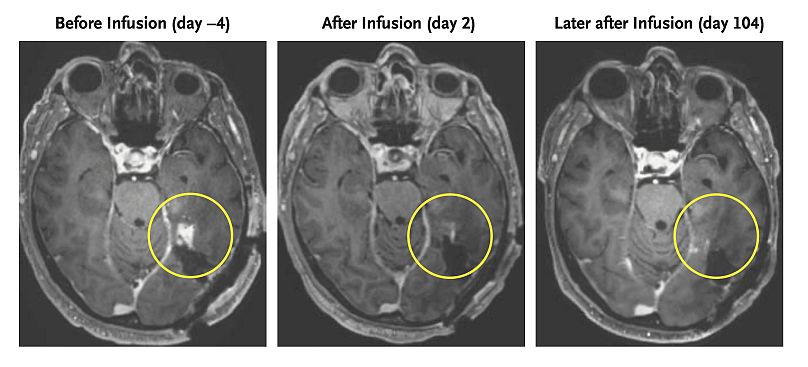A new strategy to attack aggressive brain cancer shrank tumours in two early tests.
A new strategy to fight an extremely aggressive type of brain tumour showed promise in a pair of experiments with a handful of patients.
Scientists took patients’ own immune cells and turned them into “living drugs” able to recognise and attack glioblastoma.
In the first-step tests, those cells shrank tumours at least temporarily, researchers reported on Wednesday.
So-called CAR-T therapy already is used to fight blood-related cancers like leukaemia but researchers have struggled to make it work for solid tumours.
Now separate teams at Massachusetts General Hospital and the University of Pennsylvania are developing next-generation CAR-T versions designed to get past some of glioblastoma’s defenses.
“It’s very early days,” cautioned the University of Pennsylvania's Dr Stephen Bagley, who led one of the studies.
But “we’re optimistic that we’ve got something to build on here, a real foundation".
Hard to treat cancer
Glioblastoma, the brain cancer that killed President Joe Biden’s son Beau Biden and longtime Arizona Sen. John McCain, is fast-growing and hard to treat. Patients usually live 12 to 18 months after diagnosis. Despite decades of research, there are few options when it returns after surgery and radiation.
The immune system's T cells fight disease but cancer has ways to hide. With CAR-T therapy, doctors genetically modify a patient’s own T cells so they can better find specific cancer cells. Still, solid tumours like glioblastoma offer an additional hurdle - they contain mixtures of cancer cells with different mutations. Targeting just one type allows the rest to keep growing.
Mass General and Penn each developed two-pronged approaches and tried them in patients whose tumours returned after standard treatment.
At Mass General, Dr Marcela Maus’ lab combined CAR-T with what are called T-cell engaging antibody molecules — molecules that can attract nearby, regular T cells to join in the cancer attack. The result, dubbed CAR-TEAM, targets versions of a protein called EGFR that’s found in most glioblastomas but not normal brain tissue.
The University of Pennsylvania's approach was to create “dual-target” CAR-T therapy that hunts for both that EGFR protein plus a second protein found in many glioblastomas.
Both teams infused the treatment through a catheter into the fluid that bathes the brain.
Mass General tested three patients with its CAR-TEAM and brain scans a day or two later showed their tumours rapidly began shrinking, the researchers reported in the New England Journal of Medicine.
“None of us could really believe it,” Maus said. “That doesn’t happen".
Two of the patients' tumours began to regrow soon and a repeat dose given to one of them didn’t work. But one patient’s response to the experimental treatment lasted more than six months.
Similarly, Penn researchers reported in Nature Medicine that the first six patients given its therapy experienced varying degrees of tumour shrinkage. While some rapidly relapsed, Bagley said one treated in August so far hasn't seen regrowth.
For both teams, the challenge is to make it longer-lasting.
“None of this is going to matter if it doesn't last,” Bagley said.












